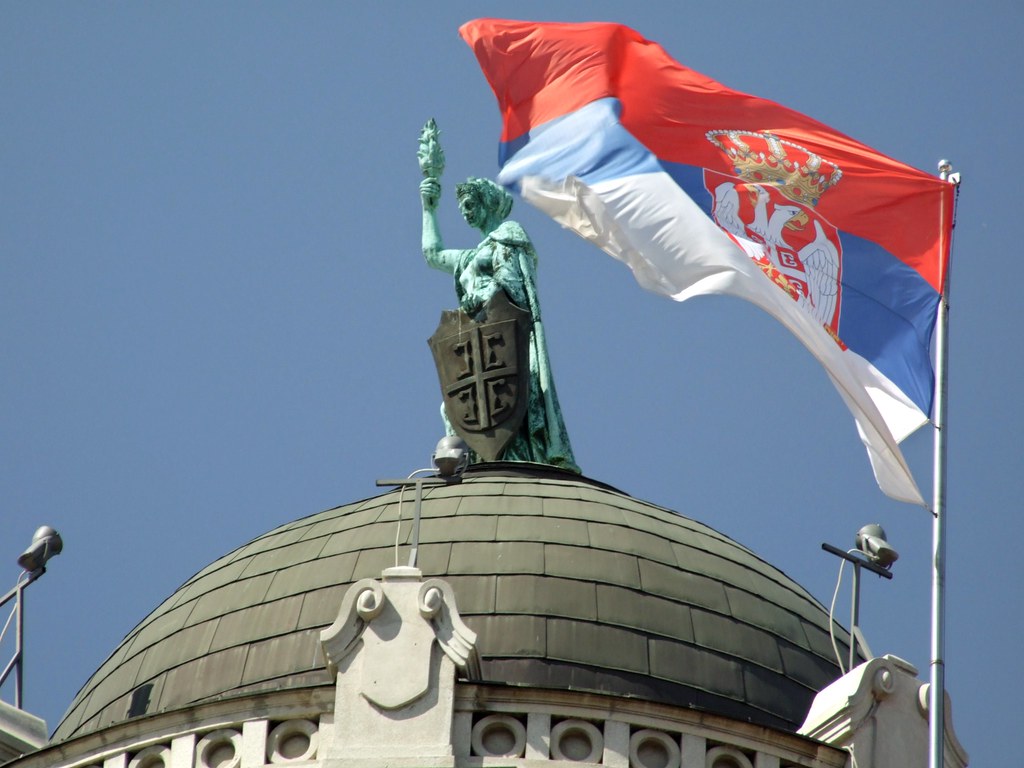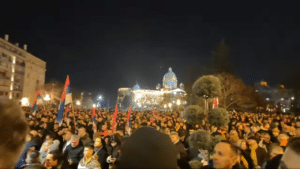Photo: The Serbian flag flies over a government building in the capital Belgrade. Source: Flickr
The December 2023 Serbian elections, marked by widespread fraud and manipulation, are part of a worrying trend of democratic decline in Serbia. In response, Serbs took to the streets en masse to protest the fraud, the uneven political playing field and the overall state of democracy and rule of law in the country.
International scrutiny of the irregularities in these elections is very important. On February 8, the European Parliament convincingly passed a resolution (461 in favor, 52 against) calling for an independent investigation into the many reported abuses. If it turns out that Serbian authorities have been actively involved, the Parliament considers halting various subsidies to the country. FMS spoke about the developments in Serbia with MEP Thijs Reuten of the PvdA and activist Milos Đajić of the Center for Modern Skills.
Longstanding abuses around elections
Reuten led a delegation of election observers on behalf of the European Parliament during previous elections in 2022. “Back then it was already clear that the party of Vučić (the Serbian president, ed.) completely dominated the media, large groups of voters were pressured and there were also reports of voters being brought in on buses and of incorrect electoral registers,” says Reuten. Đajić: “Civil society and opposition parties are intimidated and put in a bad light by pro-Vučić media – this is a big problem.”
Reuten thinks the investigation requested by the European Parliament into the electoral fraud is a good initiative. “But it only makes sense if effective sanctions are attached to it if it is established that the government is actively involved in this. It is also important to speed up the investigation. In May or June of this year, there will be elections for the municipalities that were not covered by the end of 2023.”
The elections are a new low in Serbia’s autocratization. Never before have irregularities occurred on such a large scale. Consequently, there is great concern among Serbian opposition and civil society about the declining freedom in the country. “The EU should be more assertive in its stance toward the government and attach stronger sanctions to the restriction of freedoms in Serbia. Right now, there is some disappointment among the opposition. They had hoped for a more assertive attitude from their European allies” states Đajić.
Đajić: “Civil society organizations are tired and divided, it is very important for the EU to make more efforts to support such organizations and free press in Serbia.”
Power consolidation with the help of the media
“The importance of a strong EU message in Serbia is great” says Đajić. “This does not yet sufficiently reach the average Serb, partly due to the lack of attention to it in education and television. In this, the EU is fighting a difficult battle against Vučić’s dominant regime.” Reuten says it is important to realize that Vučić says different things in Brussels than he does in Serbia, where he determines, through newspapers and television, the attitude of many Serbs toward the EU. “You only have to turn on the television or you hear stories about the unfair treatment of Serbia by the EU, the hypocrisy of the West and so on. It is incredibly difficult to reach Serbs who might want the country to take a different course through mainstream media,” Reuten argues.
As in other autocracies – such as neighboring Hungary – government control of virtually all media outlets has become part of a built-up system to consolidate power. This is deployed very deliberately, especially around elections.
Geopolitical course also raises concerns
While officially working toward EU accession, the Vučić government continues to pursue a dual agenda on its foreign policy. “Take, for example, the proud presentation of a Russian weapon system last week in Belgrade” says Reuten. “Serbia – especially in Brussels and when meeting European leaders – says it wants to join the EU and benefits on all sides from this candidate status, but refuses to conform to European foreign policy. On the contrary, ties with Russia are being openly strengthened”.
Meanwhile, Belgrade eagerly claims the billions of euros now invested in Serbia from the EU. “The European Union’s appeasement policy of weak responses to Serbian support for Russia, electoral fraud and constant stoking of unrest in Kosovo and Bosnia has not worked. Nor does it bring Serbia closer to the EU” argues Reuten. “A stricter attitude of the EU towards Serbia and effective sanctions when the country does not comply with agreements are urgently needed.”
The adopted resolution in Parliament is therefore a welcome – though small – first step. Election manipulation in December 2023 is a gross violation of democratic standards and expectations of countries with EU candidate status. But for some time now, Serbia has been troubled by issues surrounding its democracy and rule of law. As a result, the opposition and civil society are under enormous pressure. A strict EU stance is therefore crucial – with more than just words. Especially with new local elections approaching in Serbia and other autocrats in the region watching closely.



